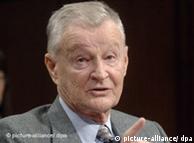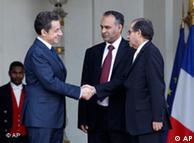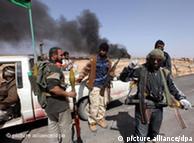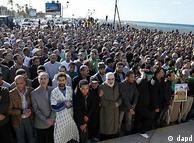Zbigniew Brzezinski served as US National Security Adviser to President Jimmy Carter from 1977 to 1981 and has also advised Barack Obama on foreign policy. He is a counselor and trustee at the Center for Strategic and International Studies (CSIS) and a professor of American foreign policy at Johns Hopkins University in Washington, DC.
Deutsche Welle: Germany, in a move that surprised many allies, decided to abstain in a UN Security Council vote on establishing a no-fly zone over Libya, siding with China and Russia, instead of its traditional allies France, Britain and the US. What's your assessment of Berlin's decision and the motives behind it?
Zbigniew Brzezinski: I think the motives behind it are understandable and credible and obviously rooted in Germany's historical experience. However, from a strategic point of view I think it was an unfortunate decision. It seems to me that the crisis involving Libya is a crisis that provides the West with a rather unique opportunity for united action and I would have been more pleased if Germany had chosen to be in some fashion part of it, even if not necessarily a direct military participant.
I may say in passing that I feel the same way about the somewhat passively neutral stand that Poland has taken on this issue. And for obvious reasons I have an interest in observing how Poland conducts itself in the international arena.
President Barack Obama was also not overly keen himself to use military force and has repeatedly emphasized that this is not a US, but an international mission that is authorized by the UN. Do you think because of Obama's initial skepticism there is if not sympathy, but an understanding of the German position in the White House or could this damage Germany's standing in the US?
I don't think it will in any significant way damage Germany's standing in the US. And I don't sense that the American public is particularly concerned, especially since the American public itself is somewhat divided on this issue. Nonetheless, I think it was unfortunate that for whatever reasons Germany took that stance, because I think what is involved here is a missed opportunity to underline, to affirm something that is desirable and important, namely the ability of the West to act in common.
You have supported military action against Libyan leader Moammar Gadhafi. But isn't there a real danger that this protracted conflict could drag on for a long time and turn into a slippery slope that makes NATO ground troops necessary to finally end the violence?
The more united the West is, the shorter the conflict will be. Because obviously Gadhafi and his associates want to prolong the conflict, create a stalemate and in some fashion remain in power. So it's not irrelevant to the outcome how united the West is and how determined it is. I think if it is determined and if it applies its military efforts with some degree of firmness bearing in mind that the UN resolution permits all necessary actions I think the chances are that we will avoid a protracted conflict.
I think the only possible outcome that assures security for Libyan people and their freedom of choice politically is an outcome that does not include him as part of the political picture.
While the West is engaged in Libya, it appears that many other Arab regimes are also on the brink of collapse. Do you also consider the intervention in Libya as a warning shot for other Arab rulers as the French President has said?
I think each case has to be looked at on its own merit in terms both of the possibilities of responding effectively to it and also in terms of the dangers that a particular case poses for the region and for international stability more generally. So I don't think that you can draw some sort of arbitrary conclusion from one single case important though it is.
The situation in Syria, a key country in the Middle East, seems very volatile. How strong is Assad's grip on power in your assessment and what would his fall mean for the region?
It's very difficult for me to assess how strong is grip on power is, especially since it appears that he himself perhaps doesn't know how strong it is. I think we all need to be a little bit modest regarding our ability to predict trends abroad and especially in societies which are superficial and yet at the same time quite a bit infirm.
The governments in Bahrain and Yemen, two vital US allies, also look very fragile. Can the US square the circle to support the democracy movements and at the same time prop up or help those autocratic rulers stay in power?
I think as I said each case has to be looked at on its own merits and in the context of its own specificity. In general, the United States has gone quite far in expressing its support for democratic movements. But the circumstances in each of these countries are not quite the same as they have emerged in Libya and for that matter they are not quite the same as they are now in Egypt or in Saudi-Arabia.
Compared to the most other countries, the situation in Saudi-Arabia has been relatively stable so far. Why in your opinion is this so and do you think that the Saudi King can feel 'safe?'
He probably cannot feel safe entirely in view of what has been happening with his neighbors. Nonetheless, the fact is that the Saudi monarchy seems to have deeper roots in the society. The society still is somewhat more traditional and the country is very rich and the political leadership is intelligently sharing some of that wealth with the public. Whether that is sufficient to a degree only time will tell.
And in the end it is I think reasonable to assume that hereditary monarchies as an actual form of government rather than a symbolic form of government are increasingly becoming somewhat associated with the past and less and less with the present and even less and less so with the future.
What's your take on Iran, also a country where there have been some protests, but compared to other countries in the region, the situation there appears to be reasonably calm at the moment?
We have to bear in mind that there was a major outburst of democratic aspirations not such a long time ago and that it was effectively crushed by the regime. I suspect that a great deal of the current political reality in Iran is part of a basic division between the urban and the more rural parts of the country. The urban parts, particularly in Tehran itself, are more similar to Turkey and through Turkey even to Europe. Certainly the young people who were demonstrating against the regime not such a long time ago looked very similar both in their appearance, but also even in their aspirations and language to the young people in Europe.
In contrast, the more rural areas, the smaller towns seem to be more conservative, more accepting of the theological regime that has been imposed on Iran and apparently that has sufficient social depth to make that regime for the time being stable. In the long run, I think that kind of theocratic, fundamentalist authority is as vulnerable or even more so than the hereditary royal systems. So that in the long run - provided the West does not isolate Iran to the point that Iranian nationalism is fused with fundamentalism - I think Iran will have to change and will change.
Only a few months ago, no one could have imagined that a NATO mission would be enforced over Libya. Do you foresee or envision any other NATO action in the region involving other countries?
Anyone can envision or speculate about it, but as a practical matter, I don't think one can anticipate too many activities of this sort too frequently and certainly not at the same time. Resources are limited, and NATO's are also. Still, NATO is a defensive alliance. If something happened that threatened its members, which includes the United States also, it would be duty bound to respond.
Germany has said that it wouldn't take part in any military mission in Libya. Could Germany do anything else in your opinion to perhaps support the mission with nonmilitary means? Do you have any ideas what Berlin could do?
I don't have any ideas that I want to propound publicly. But certainly Germany has ways of indicating its solidarity and its support for what is being done by the NATO alliance of which Germany is a very very important member. It is however up to the Germans themselves to decide what they feel collective security implies regarding their stand and their engagement.
Interview: Michael Knigge
Editor: Rob Mudge
 Διάσημοι αστέρες της μεγάλης οθόνης, τραγουδιστές και πολιτικοί θα παρευρεθούν σήμερα σε μουσική εκδήλωση στο Λονδίνο για να τιμήσουν τον πρώην σοβιετικό πρόεδρο Μιχαήλ Γκορμπατσόφ, ο οποίος στις αρχές του μήνα έκλεισε τα 80ά του γενέθλια. Την εκδήλωση θα παρουσιάσουν οι αμερικανοί ηθοποιοί Κέβιν Σπέισι και Σάρον Στόουν.«Ο Μιχαήλ Γκορμπατσόφ είναι ένας από τους λίγους ανθρώπους που μπορεί να δικαιολογήσει τον τίτλο 'Ο άνθρωπος που άλλαξε τον κόσμο',» αναφέρει το Royal Albert Hall στην ιστοσελίδα του, όπου προβάλλει την φιλανθρωπική εκδήλωση που θα πραγματοποιηθεί στον ίδιο χώρο.
Διάσημοι αστέρες της μεγάλης οθόνης, τραγουδιστές και πολιτικοί θα παρευρεθούν σήμερα σε μουσική εκδήλωση στο Λονδίνο για να τιμήσουν τον πρώην σοβιετικό πρόεδρο Μιχαήλ Γκορμπατσόφ, ο οποίος στις αρχές του μήνα έκλεισε τα 80ά του γενέθλια. Την εκδήλωση θα παρουσιάσουν οι αμερικανοί ηθοποιοί Κέβιν Σπέισι και Σάρον Στόουν.«Ο Μιχαήλ Γκορμπατσόφ είναι ένας από τους λίγους ανθρώπους που μπορεί να δικαιολογήσει τον τίτλο 'Ο άνθρωπος που άλλαξε τον κόσμο',» αναφέρει το Royal Albert Hall στην ιστοσελίδα του, όπου προβάλλει την φιλανθρωπική εκδήλωση που θα πραγματοποιηθεί στον ίδιο χώρο.







 The people of Tripoli reportedly harbor prejudices about the East of the country
The people of Tripoli reportedly harbor prejudices about the East of the country
